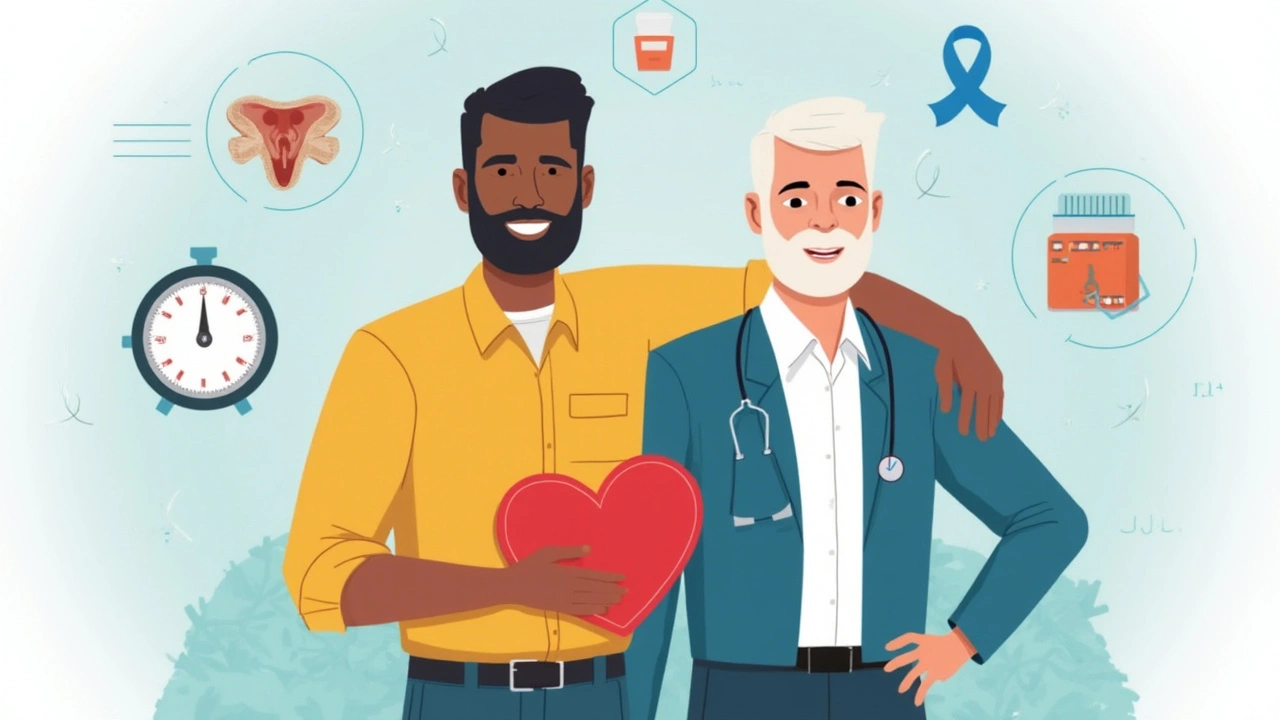If you’ve ever spent hours at the GP because you can’t quite pee right, or had your doctor cluck at your blood pressure results, Hytrin—also known as terazosin—might be a name you’ve seen bobbing up on prescriptions. Even people who’ve never heard of it might be surprised at just how many blokes (and a fair few women, too) actually take it across the UK. This is not one of those “this is interesting for someone else” drugs. Hytrin quietly punches above its weight against two issues that can mess with your life: high blood pressure and benign prostatic hyperplasia (an enlarged prostate, if you want the plain English version). It’s not new, either—Hytrin’s been approved in the UK since the 1990s. Why does it stick around? Well, let’s just say not many pills make it past a couple of decades of competition unless they get results.
How Hytrin Works and Who Uses It?
Here’s something not everyone knows: Hytrin (terazosin) isn’t your run-of-the-mill blood pressure medicine, nor is it just a prostate pill. It slots into a category called alpha-blockers. So, what does that mean in the real world? It helps relax certain muscles and blood vessels—think of your arteries and your bladder neck. That makes it great for folks whose blood pressure keeps creeping up, or for the lads over 50 whose trips to the loo are getting longer and longer.
You take Hytrin once a day, usually at night. Why at night? Because it can make you dizzy, especially at first. There’s an actual name for this: the "first-dose effect." Basically, you can feel light-headed the first few times you take it. A tip from the pros: take your first tablet while sitting or lying down, just in case. Now, check this out: in the UK, nearly 15% of men aged over 60 have benign prostatic hyperplasia severe enough to consider medication. Meanwhile, an estimated 12 million Brits have high blood pressure, though not all of them are on treatment. That puts Hytrin in the medicine cabinets of a lot of people—enough that the NHS hands out thousands of prescriptions each month.
The way Hytrin works is by blocking alpha-1 receptors in smooth muscle. In simple terms: your blood vessels relax, so your blood flows more easily, and your bladder outlet chills out, letting you pee without feeling like you’re battling a trickling garden hose. Especially for guys with prostate trouble, Hytrin can halve the number of nightly trips to the bathroom. For blood pressure, studies have shown it’s effective at getting those numbers down—often paired with other drugs if your doc wants a belt-and-braces approach.
This info isn’t just from leaflets in pharmacy bags—real-world research backs it up. The UK’s NICE guidance still lists terazosin for both BPH and hypertension. Clinical trials going back to the 1990s, including a famous one called the TOMHS study, showed blood pressure improvements of 10 to 15 mmHg systolic, which isn’t small potatoes.
| Condition | % of UK Adults Affected | Average Hytrin Prescription/Year |
|---|---|---|
| Benign Prostatic Hyperplasia (BPH) | 16% (men over 60) | Over 100,000 |
| High Blood Pressure (Hypertension) | 27% (all adults) | 85,000 |
But it’s not just about men! Women with high blood pressure sometimes get prescribed Hytrin, though it's more common for men because of the prostate benefit.

Potential Side Effects and What to Expect Day-to-Day
A lot of people hear “alpha-blocker” and immediately think of fainting spells or feeling woozy. That’s not just a myth, but it’s also not a guarantee. When you start Hytrin, especially the first few doses, dizziness might hit you—mainly if you stand up too fast. That’s why doctors always suggest taking it right before bed. And here’s a personal tip: don’t schedule any marathons or at-home DIY projects the day you start. Just take it slow until your body adjusts, usually after a week or so.
Other common side effects? Headache, stuffy nose, or—rarely—swollen ankles. Some blokes worry about how it’ll affect, let’s say, “performance.” The honest answer: it can rarely cause issues with ejaculation, but for most, things stay the same. If anything unusual pops up (like a really fast heartbeat or fainting spells), ring your GP. But keep perspective: less than five percent of folks actually stop Hytrin because the side effects bother them.
One quirky fact: Hytrin might bring relief to migraine sufferers. There’s small-scale evidence from some UK clinics, and doctors in the past have occasionally tried it off-label for that reason. Don’t count on it as a migraine cure, but if you already get migraines, pay attention to changes (good or bad) when you start it.
If you’re into numbers, the stats are pretty clear: in a review of over 8,000 UK patients, about 20% reported mild dizziness in the first week. Only 2% had to switch because side effects were too much. Compare that to other alpha-blockers like doxazosin, and Hytrin generally gets marks for being less likely to mess with your energy levels long-term, though everyone’s body reacts a bit differently.
| Side Effect | How Common? | What To Do? |
|---|---|---|
| Dizziness | 1 in 5 | Take at night, rise slowly |
| Headache | 1 in 10 | Avoid alcohol, stay hydrated |
| Retrograde Ejaculation | 1 in 50 | Talk to your GP if concerned |
| Palpitations | Less than 1 in 100 | Contact doctor for advice |
Let’s clear up a myth: Hytrin doesn’t shrink the prostate. What it does is relax the muscles, so you feel fewer symptoms. If you want something that genuinely shrinks prostate size, your doctor may suggest a different class, like finasteride.
If you forget a dose, don’t panic. Take it as soon as you remember, unless it’s nearly time for the next. But here’s a tip: if you’ve missed Hytrin for a day or two, check with your GP before restarting. There’s that risk of “first-dose” dizziness all over again.
For anyone on other pills—especially for blood pressure or erectile dysfunction—talk to your doc. Mixing Hytrin with other drugs that lower blood pressure can sometimes push things a bit too low. A real-world pointer: don’t try your luck with over-the-counter herbal stuff or supplements unless your pharmacist says it’s alright. Ginseng and Hytrin? Not the best mix.

Living With Hytrin: Tips and Real-Life Experiences
Life on Hytrin isn’t supposed to feel like you’re taking a powerful sedative every night. Most people, after a week or so, barely notice it—except that their blood pressure starts to nudge down, or those urgent midnight dashes to the loo become less frantic, a genuine win for blokes with BPH. Here’s what might surprise you: the difference Hytrin makes is often more dramatic for guys with prostate issues than those using it for blood pressure alone. A classic NHS blood pressure target is under 140/90 mmHg, and for many, Hytrin is a solid piece of the puzzle.
Let’s go practical: you’re more likely to stick with Hytrin if you build a routine around bedtime. Set an alarm at night for the first few weeks so you don’t forget. Keep a log of how you’re feeling each morning—a simple tick-box tracker works wonders. Track dizziness. Track how often you’re hitting the loo overnight. It gives you solid details to chat about at your next check-in. Some GPs might even ask for this info to adjust your dose.
If you’re on it for enlarged prostate, expect changes within two weeks. By a month, guys usually notice less pee urgency, a better flow, and less getting up at night (sometimes half as much as before). For high blood pressure, Hytrin needs a bit longer—expect blood pressure improvement by week four, peaking at about six weeks. Are there foods or drinks you should avoid? Grapefruit usually gets a pass, but limiting heavy alcohol is wise—Hytrin can amplify the boozy wobbles. Stay hydrated, especially if it’s hot outside or you’re hitting the gym regularly.
If you drive, mind that first-week dizziness, especially in the mornings. Some people find their eyes are dry or sensitive to light, but that passes quickly. And if you get any chest pain or fainting, ring 111 or pop down to A&E—better safe than sorry.
The NHS offers free blood pressure check stations in most Leeds pharmacies these days—take advantage if you’re nearby. With wearable health tech on the rise, keeping an eye on your blood pressure at home isn’t just for tech geeks. Even a £25 monitor off Amazon will do the job. There’s evidence that tracking at home doubles your odds of staying in the healthy range, simply because you can catch blips before they become a problem. And if you’re tech-savvy, there are plenty of smartphone apps that sync up blood pressure logs with GP records. Don’t be shy about bringing your numbers to your next appointment.
One underrated tip: tell your eye doctor if you’re getting cataract surgery. Hytrin can cause something called intraoperative floppy iris syndrome, a rare but real issue during eye ops. The upshot? Surgeons just need to know—makes the surgery smoother, less risky.
Plenty of people share their experiences on UK health forums. Some common threads: “First week felt odd, but it settled down.” “Didn’t notice a big difference at first, but by week three, I was waking up to pee less.” “Blood pressure dropped a bit, but needed another tablet alongside it.” It’s fair to say Hytrin is rarely a solo act for blood pressure—the NHS prefers to combine it with a thiazide diuretic or a calcium channel blocker for full effect. Still, some people do fine with Hytrin alone, especially if their numbers weren’t too sky-high to start.
- Start Hytrin at night to dodge dizziness
- Stick to a regular bedtime routine
- Keep a side-effect and symptom tracker for your first few weeks
- Let healthcare staff know if you’ve missed a dose for more than two days
- Tell your optician about Hytrin before any eye surgery
- Limit alcohol, and avoid starting new supplements without approval
- Make use of blood pressure monitors, even at home
So, Hytrin can slot quietly but effectively into daily life for a lot of folks. The big draw is its double-barrel action for blood pressure and prostate symptoms—no other single pill does quite the same. It doesn’t suit everyone, but for those it fits, Hytrin helps keeps life on an even keel instead of being bossed around by annoying (sometimes risky) symptoms. And when you think about how many others in Leeds and around the UK are quietly doing the same, you realise you’re in pretty good company.




Tiffany Fox, June 27, 2025
Took Hytrin for a bit after my BP spiked post-menopause. First week? Felt like I was walking through syrup. But after that? Nighttime peeing dropped from 4x to once. Life-changing. No drama, just quiet relief.
Rohini Paul, June 29, 2025
My dad’s been on this for 8 years. He says it’s the only thing that didn’t make him feel like a zombie. Also, he swears it helped his snoring. Not sure if that’s real or just dad logic, but he’s happy 😊
Courtney Mintenko, June 29, 2025
Alpha-blockers are just capitalism’s way of selling you a fix for aging. You think your prostate is the problem? Nah. It’s your fear of getting old. Take a walk. Drink water. Stop letting Big Pharma tell you what your body needs. 🤡
Sean Goss, June 30, 2025
Let’s be real-terazosin’s pharmacokinetics are suboptimal for monotherapy in stage II hypertension. The alpha-1A receptor selectivity is poor compared to tamsulosin, and the half-life variability introduces significant interpatient fluctuations. Plus, the first-dose effect isn’t ‘quirky’-it’s a Class I safety concern. If your doc prescribes this without a baseline orthostatic BP check, they’re negligent. 📉
Khamaile Shakeer, July 2, 2025
Bro, I tried this after reading your post… first night, I nearly face-planted into the toilet 😅. But honestly? After 2 weeks, I’m not waking up to pee like a robot anymore. Also, my wife says I’m less grumpy. Maybe it’s the sleep? Maybe it’s the placebo? Who knows. But I’m not complaining 🤷♂️💊
Suryakant Godale, July 2, 2025
Thank you for the comprehensive overview. I have observed, through clinical practice, that patients who adhere to nocturnal dosing and maintain consistent hydration protocols exhibit significantly fewer adverse events. Furthermore, the integration of home blood pressure monitoring has demonstrated improved therapeutic compliance and reduced clinic visit frequency. It is advisable to consult with a pharmacist regarding potential herb-drug interactions, particularly with ginseng and St. John’s wort, which may potentiate hypotensive effects. This medication, while not universally ideal, remains a viable option within a structured management framework.